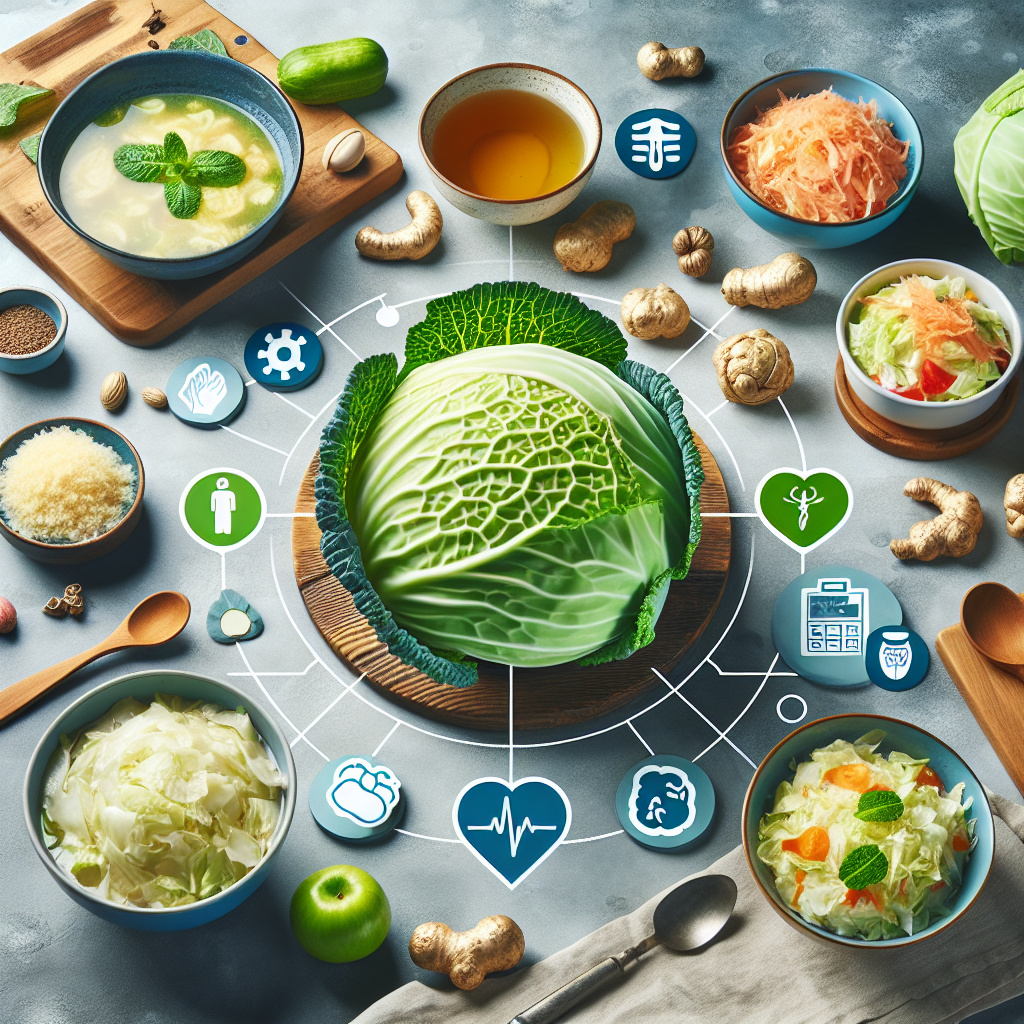Cabbage, a humble and often underrated vegetable, holds a myriad of benefits for your health and overall well-being. From its high nutrient content to its potential illness-fighting properties, incorporating cabbage into your diet can have a positive impact on your life. With its low calorie and high fiber content, this leafy green can aid in digestion and weight management. Additionally, cabbage is packed with vitamins and minerals, such as vitamin C and potassium, which can boost your immune system and improve heart health. Join us as we explore the numerous advantages of adding cabbage to your plate and discover how this unassuming vegetable can contribute to a healthier you.

Nutritional Benefits
Vitamin C
Cabbage is packed with vitamin C, which is essential for a healthy immune system. This vitamin is known for its ability to boost the production of white blood cells, which are vital for fighting off infections and diseases. By including cabbage in your diet, you can increase your vitamin C intake and give your immune system a much-needed boost.
Vitamin K
Cabbage is also a rich source of vitamin K, which plays a crucial role in blood clotting and bone health. This vitamin helps in the formation of blood clotting factors, which are necessary for the body to stop bleeding when injured. Additionally, vitamin K is essential for maintaining strong and healthy bones, as it helps in the absorption of calcium. So, by consuming cabbage regularly, you can ensure that you’re getting enough of this important nutrient.
Folate
Folate, also known as vitamin B9, is another nutrient found in cabbage that offers numerous health benefits. It is especially important for pregnant women, as it supports fetal development and helps reduce the risk of certain birth defects. Folate is also necessary for the production of red blood cells and DNA synthesis, making it essential for overall health and well-being.
Fiber
Fiber is an essential component of a healthy diet, and cabbage is an excellent source of this dietary fiber. Including cabbage in your meals can promote regular bowel movements and prevent constipation. The fiber in cabbage adds bulk to your stool, making it easier to pass through your digestive system. It also helps maintain the health of your gut and promotes optimal digestion.
Antioxidants
Cabbage contains a variety of antioxidants, which are compounds that help protect your cells from damage caused by free radicals. These harmful molecules can contribute to the development of chronic diseases, such as heart disease and cancer. By consuming cabbage, you can increase your intake of antioxidants and reduce your risk of these diseases. Antioxidants also contribute to overall health and well-being by supporting healthy aging and reducing inflammation in the body.
Digestive Health
Promotes Regular Bowel Movements
Cabbage is a great addition to your diet if you’re looking to promote regular bowel movements. Thanks to its high fiber content, cabbage adds bulk to your stool, making it easier to pass through your digestive system. It helps prevent constipation and promotes a healthy digestive system overall.
Prevents Constipation
Cabbage’s fiber content also helps prevent constipation. By adding cabbage to your diet, you can ensure that your digestive system stays regular and avoids the discomfort and bloating associated with constipation. It keeps things moving smoothly and promotes optimal digestive health.
Aids in Digestion
Cabbage is rich in enzymes that aid in digestion. These enzymes help break down food and facilitate the absorption of nutrients. By including cabbage in your meals, you can support your digestive system and ensure that you’re getting the most from your food.

Weight Management
Low in Calories
Cabbage is a low-calorie food, making it an excellent choice for those looking to manage their weight. It is nutrient-dense while being low in calories, which means you can eat a satisfying portion without consuming excessive calories. Incorporating cabbage into your meals can help you feel fuller for longer without adding unnecessary calories to your diet.
High in Fiber
The high fiber content of cabbage also aids in weight management. Fiber promotes feelings of fullness and reduces hunger cravings. By including cabbage in your meals, you can increase your daily fiber intake and help control your appetite, ultimately supporting your weight management goals.
Promotes Satiety
Thanks to its high water and fiber content, cabbage is an incredibly filling food. Including cabbage in your meals can help you feel satisfied and keep you from reaching for unhealthy snacks or overeating. It promotes satiety, making it a valuable addition to any weight management plan.
Heart Health
Reduces Cholesterol Levels
Cabbage offers heart-healthy benefits by helping to reduce cholesterol levels. The fiber in cabbage binds to cholesterol in the digestive system and prevents its absorption into the bloodstream. By incorporating cabbage into your diet, you can lower your LDL (bad) cholesterol levels and reduce your risk of heart disease.
Lowers Blood Pressure
Cabbage is also beneficial for maintaining healthy blood pressure levels. It is a good source of potassium, a mineral that helps regulate blood pressure by promoting blood vessel dilation and reducing the effects of sodium. By including cabbage in your meals, you can support cardiovascular health and keep your blood pressure in check.
Reduces Risk of Heart Disease
By promoting lower cholesterol levels and regulating blood pressure, cabbage reduces the risk of heart disease. Heart disease is a leading cause of death worldwide, and making cabbage a regular part of your diet can help protect your heart and keep it healthy.

Cancer Prevention
Anticancer Properties
Cabbage is rich in compounds that have been shown to have anticancer properties. These compounds, such as sulforaphane and indole-3-carbinol, help neutralize carcinogens and inhibit the growth of cancer cells. By consuming cabbage regularly, you can potentially reduce your risk of certain types of cancer, including lung, breast, and colon cancer.
Boosts Immune System
Cabbage’s high vitamin C content also plays a role in cancer prevention by boosting the immune system. Vitamin C is a powerful antioxidant that helps protect cells from damage and strengthens the immune system’s ability to fight off cancer cells. Including cabbage in your diet can provide your body with the nutrients it needs to support a healthy immune system and reduce your risk of cancer.
Anti-inflammatory Properties
Reduces Inflammation
Cabbage has anti-inflammatory properties that can help reduce inflammation in the body. Chronic inflammation is associated with the development of various diseases, including heart disease, diabetes, and certain types of cancer. By adding cabbage to your meals, you can help decrease inflammation and support overall health and well-being.
Alleviates Symptoms of Arthritis
The anti-inflammatory properties of cabbage can also alleviate symptoms of arthritis, a condition characterized by joint inflammation and stiffness. Consuming cabbage regularly can help reduce joint pain, swelling, and tenderness, improving the quality of life for those with arthritis.

Skin and Hair Health
Promotes Healthy Skin
Cabbage is beneficial for skin health due to its high vitamin C content. Vitamin C promotes collagen production, which helps keep the skin firm and youthful-looking. Consuming cabbage can help reduce the appearance of wrinkles and keep your skin healthy, glowing, and vibrant.
Reduces Signs of Aging
In addition to promoting healthy skin, cabbage also helps reduce signs of aging. Its antioxidant properties help protect the skin from damage caused by free radicals, which can contribute to premature aging. Regular consumption of cabbage can help maintain a youthful appearance and slow down the aging process.
Improves Hair Health
Cabbage’s nutritional benefits extend to hair health as well. The presence of vitamins A and C in cabbage promotes healthy hair growth and strengthens hair follicles. Including cabbage in your diet can help improve the overall health and appearance of your hair.
Eye Health
Protects Against Macular Degeneration
Cabbage contains nutrients that promote good eye health, including vitamin C and beta-carotene. These nutrients help protect against macular degeneration, a common eye condition that can lead to vision loss. By including cabbage in your diet, you can support the health of your eyes and reduce the risk of age-related eye diseases.
Prevents Cataracts
Cabbage’s high vitamin C content also plays a role in preventing cataracts, a clouding of the lens of the eye that can impair vision. Consuming cabbage regularly can provide your eyes with the necessary nutrients to maintain their health and reduce the risk of cataracts.

Brain Health
Improves Cognitive Function
Cabbage is rich in nutrients that support brain health and cognitive function. The presence of vitamin K in cabbage is particularly beneficial for brain health, as it helps improve memory and concentration. Regular consumption of cabbage can help keep your brain sharp and enhance cognitive function.
Prevents Degenerative Brain Diseases
Cabbage’s antioxidant properties also contribute to brain health by protecting against degenerative brain diseases, such as Alzheimer’s and Parkinson’s. The antioxidants in cabbage help neutralize free radicals that can damage brain cells and contribute to the development of these diseases. By including cabbage in your diet, you can potentially reduce your risk of age-related cognitive decline.
Pregnancy Health
Rich in Folate
Folate, or vitamin B9, is crucial for pregnant women as it supports fetal development. Cabbage is a rich source of folate, making it an excellent choice for expectant mothers. Adequate folate intake during pregnancy is essential for preventing birth defects and promoting the healthy growth of the baby.
Supports Fetal Development
The folate found in cabbage plays a vital role in the formation of the baby’s neural tube, which eventually develops into the baby’s brain and spinal cord. By including cabbage in your pregnancy diet, you can ensure that you’re providing your baby with the necessary nutrients for healthy growth and development.
In conclusion, cabbage offers a wide range of health benefits, making it a valuable addition to any diet. From its high vitamin C content to its anti-inflammatory properties, cabbage supports immune health, promotes digestion, aids in weight management, and contributes to overall wellness. Whether you’re looking to improve heart health, reduce the risk of cancer, support brain function, or enhance the health of your skin and hair, cabbage can be a nutritious and versatile addition to your meals. So, why not incorporate this humble vegetable into your diet and reap the many benefits it has to offer? Your body will thank you for it!

